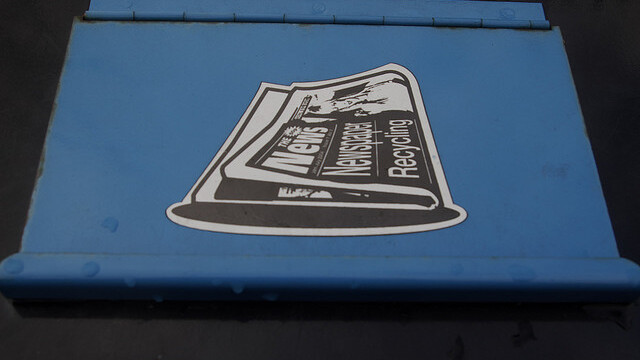
Does breaking news still make sense? Is physical media dead? How can media businesses monetize their content? These are some of the interrogations that emerged in the media world over the last few days. Let’s take a look back at a week that was particularly rich in reflection upon the future of the media industry.
[BREAKING] The death of breaking news?
A few days ago, Breaking News announced that users would now be able to add its “ticker” to their connected TV thanks to an app, and keep up with the latest news, no matter what channel they are watching. While it may seem like a detail, it confirms how big the MSNBC-owned startup has managed to become in a very short period of time.
More generally, it is one more sign of how addicted we are to the concept of ‘breaking news’. Yet, does this notion still make sense? That’s the question Slate’s political reporter David Weigel tried to answer in an interesting post this week. According to Weigel, the term ‘breaking news’, which used to be limited to ‘news of transcendent importance’, is now routinely abused to report mundane news – up to the point where it has become a joke.
 However, this could be nothing more than a curation problem. What if we only received a small amount of news stories, but only the ones that matter? This is the idea behind MustKnow News, a new iOS app that delivers 10 news items per hour to its users:
However, this could be nothing more than a curation problem. What if we only received a small amount of news stories, but only the ones that matter? This is the idea behind MustKnow News, a new iOS app that delivers 10 news items per hour to its users:
“Unlike other news apps that bring plenty of content from a large number of RSS feeds or a user’s Facebook or Twitter streams, MustKnow focuses on bringing users only the top 10 most important stories. This helps users deal with information overload and allows them to stay up-to-date in no time,” its developer Reut Shany explained.
Content curation done right
Shany is only one of several people who want to fix content curation and discovery. While some of them prefer to rely on algorithms, the Lebanese entrepreneur Mark Malkoun believes in empowering users. Here’s the vision that led him to develop the citizen journalism app Signal:
“If you want to create a complete news solution, you need a way to filter the stories by importance. Instead of having a small group of people deciding what’s important for us and what is not, we created a democratic voting system to give this privilege back to the users,” Malkoun says.
What is true for news also applies to entertainment. For instance, the social TV startup Yap.TV was born from the conclusion that people all over the world hate the “Guide” button of their remote. The recommendations we trust the most are the ones that come from our friends – and that’s why content discovery should be social.
On a higher level, there are reasons to believe that humans will still outperform algorithms when it comes to curation. New York’s tabloid ‘The Daily News’ is the proof of this. As PaidContent reports, this media outlet decided to add a new vertical on its website to target the city’s South Asian community. What’s interesting here is its understanding of what ‘local’ means. Community isn’t about zip codes; it is about shared interests, such as cricket and Bollywood – in PaidContent’s words, “local is cultural, not geographic.”

Physical media is dying
Earlier this week, Spotify unveiled a new Android app. More importantly, it announced that it would now let brands such as Reebok, McDonald’s and Intel release their own branded music apps. For Om Malik, this is “yet another reminder that physical media is dead.”
In a column titled ‘Physical media is dead — long live the app’, Malik explained that physical supports like CDs and books are “being replaced with “apps” thanks to broadband connectivity and anywhere computing that has come to us via smartphones, tablets and other connected devices.”
However, our own Boris argues that a few things are still missing for e-books to fully replace paper books. “We will still see a lot of innovation in digital books,” he writes. For instance, it should be much easier to see our personal library and to share books if we want to say goodbye to ‘pBooks’.
In the meantime, media outlets will increasingly work on bridging the gap between print and digital. This is the case of UK’s The Guardian, which is partnering with the augmented reality startup Blippar to let its readers access interactive content by scanning its print edition.
Online content is on the rise, but what’s tomorrow’s business model?
 One of the main media news this week was Read It Later’s rebranding. As we reported, it is now called ‘Pocket’, and will let its 4.5m users save content and access it later for free.
One of the main media news this week was Read It Later’s rebranding. As we reported, it is now called ‘Pocket’, and will let its 4.5m users save content and access it later for free.
The app is yet another sign of the importance of tablets in our lives – not only to read articles, but also to watch videos, hence Read It Later’s pivot. As a matter of fact, a recent study by Viacom revealed that tablets are becoming an alternative to television when users want to watch full-length TV shows.
From a journalism perspective, online content is also starting to get the attention and respect it deserves, as confirmed by 2012 Pulitzer picks. Of the 14 Pulitzer Prizes that were awarded to journalism, three went to online-only works, the Nieman Lab notes.
While most comments focused the Huffington Post’s first Pulitzer, the trend is actually deeper. According to Pulitzer officials, digital content “played a role in seven winning entries: Public Service, Breaking News Reporting, Investigative Reporting, Explanatory Reporting, National Reporting, Editorial Cartooning and Breaking News Photography.”
However, it remains to be seen how this content will be monetized. Once described as Google’s solution to newspaper woes, the news payment service One Pass was shut down earlier this week as part of the company’s ‘spring cleaning.’
Still, it doesn’t mean that Google is giving up on this issue, as the company insists that it will continue working with publishers to build new tools,” such as its Consumer Surveys (see our story ‘Google’s consumer surveys are bringing in one publisher $5,000 a month‘).
Of course, some may still argue that users aren’t prepared to pay for online content. However, Hulu Plus’ growth proves them wrong. Earlier this week, Hulu announced that its paid service had passed the 2m subscriber milestone.
When talking paywalls, Slovakia is also an interesting example to look at. Instead of a publisher-specific approach, a local startup called Piano Media managed to create what is sometimes described as ‘a national paywall’, where subscribers get access to several news outlets. This could only be a start; a few days ago, the company announced that it had raised $2.6m in Series B funding to bring its vision to the next level.
Get the TNW newsletter
Get the most important tech news in your inbox each week.





